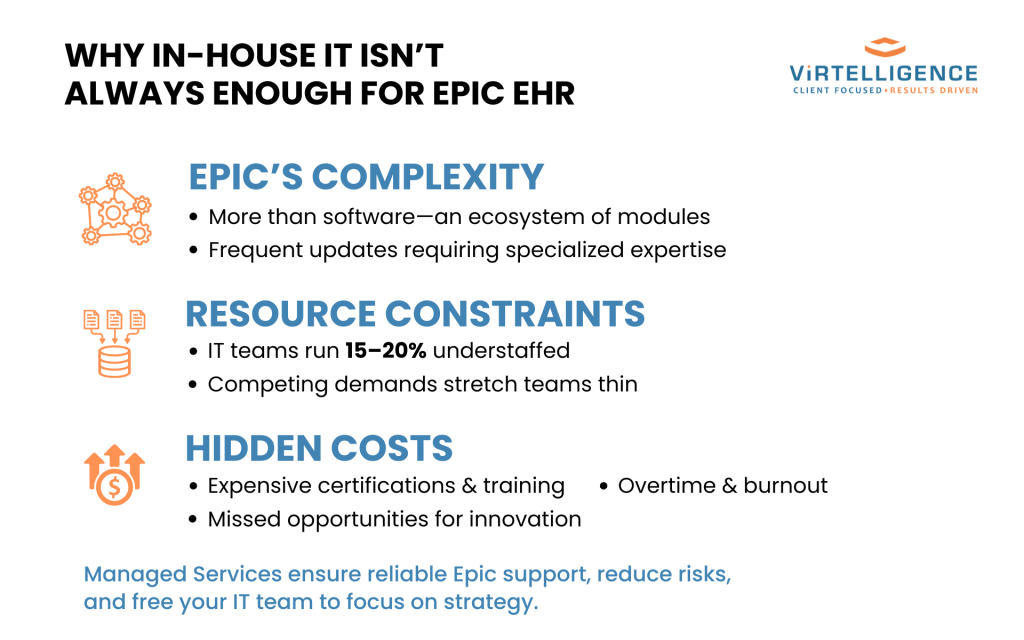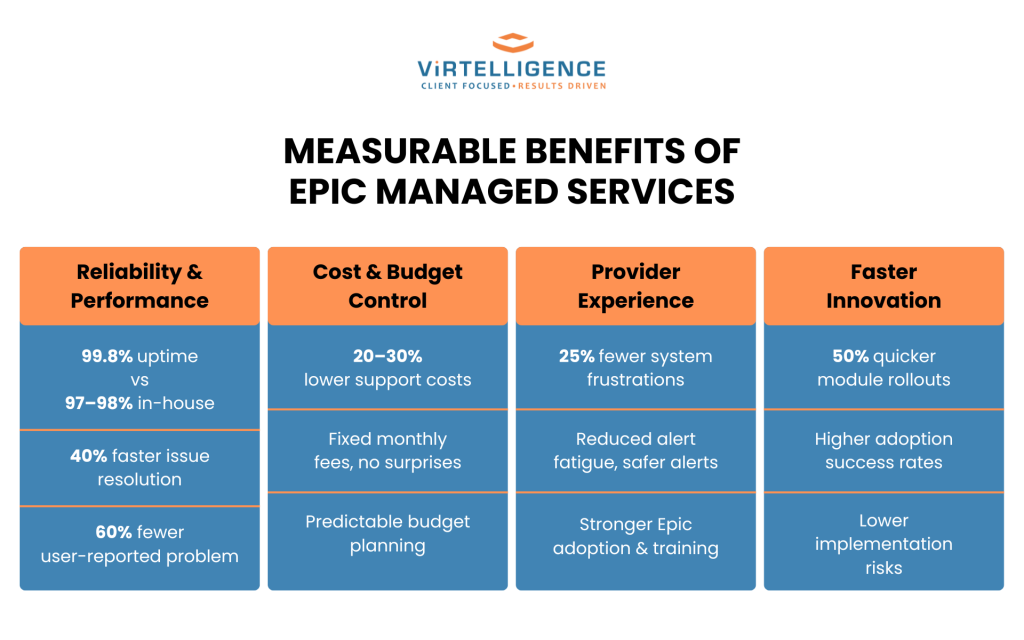
Your hospital invested millions in Epic EHR implementation. Your IT team worked tirelessly through go-live. Yet here you are, months later, dealing with system slowdowns, upgrade headaches, and staff complaints about workflow inefficiencies.
You’re not alone. Over 3,600 hospitals across the United States rely on Epic EHR systems, representing nearly 38% of the inpatient market. While Epic delivers powerful capabilities, managing this complex platform often overwhelms even the most capable in-house IT departments.
The solution isn’t replacing your internal team – it’s strategically augmenting their expertise with Epic managed services that complement and enhance your existing capabilities.
Why In-House IT Isn’t Always Enough For Epic EHR?

Epic’s Complexity Demands Specialized Expertise
Epic isn’t just software – it’s an ecosystem of interconnected modules, each requiring deep technical knowledge and ongoing optimization. Your talented IT professionals excel at managing network infrastructure, security protocols, and general healthcare technology. But Epic’s intricate workflow engine, complex reporting tools, and frequent updates demand specialized expertise that takes years to develop.
Consider this: Epic releases quarterly updates with hundreds of new features, fixes, and configuration changes. Each update requires careful analysis to determine impact on your specific workflows, extensive testing protocols, and strategic implementation planning. A single misconfigured Epic module can cascade into patient safety issues, provider frustration, and operational disruptions.
Resource Constraints in Healthcare IT Departments
Healthcare IT departments face an impossible equation. You need Epic specialists, cybersecurity experts, network administrators, help desk support, and project managers – all while operating under tight budget constraints and competing with tech companies for talent.
The average healthcare IT department operates with 15-20% fewer staff members than needed to adequately support their technology infrastructure. When Epic issues arise at 2 AM or during peak patient volume periods, your skeleton crew becomes stretched beyond capacity. Meanwhile, providers grow frustrated with system delays, and patient care quality suffers.
The Hidden Costs of Managing Epic Internally
Beyond obvious salary and benefits expenses, managing Epic internally creates hidden costs that strain your budget:
Training and Certification Expenses: Epic certification programs cost $3,000-$5,000 per person, with recertification requirements every two years. Factor in travel, time away from daily responsibilities, and ongoing education – and you’re looking at significant ongoing investments.
Overtime and Burnout: Epic support doesn’t follow business hours. System issues, upgrades, and maintenance often require after-hours work, leading to expensive overtime costs and staff burnout. High turnover rates in healthcare IT compound these expenses.
Opportunity Costs: When your internal team spends 60% of their time managing Epic maintenance and support, they’re not available for strategic initiatives, process improvement projects, or other technology implementations that could drive organizational value.
Critical Pain Points That Managed Services Address
Epic Upgrade Management and Maintenance Challenges
Epic releases major updates quarterly, each potentially affecting hundreds of workflows across your organization. Successful upgrade management requires systematic testing, staff retraining, workflow validation, and post-implementation monitoring.
Your internal team faces a dilemma: rush through upgrades and risk operational disruptions, or delay implementations and miss critical security patches and feature improvements. Either choice creates risks that managed services providers navigate expertly through proven methodologies and dedicated resources.
24/7 Support Requirements and Staffing Gaps
Healthcare operates continuously, but IT departments don’t. When Epic systems experience issues during nights, weekends, or holidays, response time directly impacts patient care. A 3 AM system slowdown in your emergency department can’t wait until Monday morning.
Epic managed services provide round-the-clock monitoring, proactive issue identification, and immediate response capabilities. Advanced monitoring tools detect performance degradation before users notice problems, while dedicated support teams resolve issues within defined service level agreements.
Data Security and HIPAA Compliance Concerns
Epic environments contain your organization’s most sensitive data – patient health information that requires rigorous protection under HIPAA regulations. Security threats evolve constantly, requiring specialized expertise to implement proper safeguards, monitor for breaches, and maintain compliance documentation.
Managed services providers employ dedicated cybersecurity specialists who focus exclusively on healthcare IT security. They maintain current knowledge of emerging threats, implement best-practice security protocols, and provide compliance reporting that satisfies regulatory requirements.
Integration Challenges with Legacy Systems
Most hospitals operate hybrid environments where Epic connects with dozens of legacy systems, third-party applications, and medical devices. Each integration point creates potential failure modes, data synchronization issues, and workflow disruptions.
Managing these complex integrations requires a deep understanding of both Epic’s integration capabilities and your legacy systems’ limitations. Managed services teams bring experience from multiple healthcare environments, providing proven solutions for common integration challenges.
How Epic Managed Services Complement Your In-House Team?
Augmenting Internal IT Capabilities (Not Replacing Them)
The most successful Epic managed services partnerships enhance your existing team rather than replacing it. Your internal staff maintains strategic oversight, organizational knowledge, and user relationships, while managed services providers handle specialized technical tasks.
This hybrid approach lets your team focus on high-value activities like workflow optimization, strategic planning, and user training while ensuring Epic’s technical requirements receive expert attention. You retain control over critical decisions while accessing specialized expertise when needed.
Access to Epic-Certified Specialists and Advanced Training
Managed services providers employ teams of Epic-certified specialists across all major modules. These professionals maintain current certifications, attend Epic user group meetings, and work with multiple healthcare organizations, giving them broader experience than any single hospital IT department can develop internally.
When you encounter complex Epic challenges – whether it’s optimizing surgical scheduling workflows or implementing advanced reporting capabilities – you can tap into deep expertise immediately rather than spending months training internal staff or struggling through trial-and-error implementations.
Scalable Support During Peak Demand Periods
Healthcare IT demands fluctuate dramatically. Epic implementations, major upgrades, acquisitions, and crisis situations create temporary spikes in support requirements that overwhelm normal staffing levels.
Managed services provide elastic capacity that scales with your needs. During go-live periods, you can access additional project managers, technical specialists, and support staff without long-term hiring commitments. When projects are completed, support levels adjust accordingly, maintaining cost efficiency.
Knowledge Transfer and Best Practices Implementation
Experienced managed services providers work with hundreds of healthcare organizations, giving them unique insights into industry best practices, common pitfalls, and innovative solutions. This knowledge transfers to your organization through consulting engagements, optimization projects, and daily operational support.
Rather than learning through expensive trial and error, you benefit from proven approaches developed across multiple Epic implementations. Your team gains access to configuration templates, workflow optimizations, and troubleshooting methodologies that would take years to develop independently.
Measurable Benefits of Epic Managed Services Partnership

Improved System Performance and Uptime Statistics
Organizations partnering with experienced Epic managed services providers typically see:
99.8% system uptime compared to industry averages of 97-98% for internally managed systems. Proactive monitoring and preventive maintenance significantly reduce unplanned outages.
40% faster issue resolution times through dedicated support teams with deep Epic expertise and established escalation procedures.
60% reduction in user-reported system problems via proactive monitoring that identifies and resolves issues before they impact end users.
Cost Optimization and Budget Predictability
Managed services transform unpredictable IT expenses into predictable monthly costs. Organizations typically experience:
20-30% reduction in total Epic support costs when comparing internal management expenses (salaries, benefits, training, overtime) against managed services contracts.
Elimination of surprise expenses from emergency support, rushed implementations, or costly mistakes that require extensive remediation.
Improved budget planning with fixed monthly fees that include all support services, training, and upgrade assistance.
Enhanced Provider Satisfaction and Reduced Alert Fatigue
Well-managed Epic systems significantly improve provider experiences:
25% reduction in provider-reported system frustrations through optimized workflows and faster issue resolution.
Improved clinical decision support effectiveness via proper alert configuration that reduces alert fatigue while maintaining patient safety.
Enhanced user adoption of Epic features through better training and support programs managed by experienced specialists.
Faster Implementation of New Epic Modules and Features
Managed services accelerate Epic capability expansion:
50% faster module implementations through proven methodologies and dedicated project resources.
Higher success rates for Epic feature adoption via proper change management and user training programs.
Reduced implementation risks through experienced project management and established testing protocols.
Choosing the Right Epic Managed Services Partner
Essential Certifications and Epic Expertise Requirements
When evaluating Epic managed services providers, verify their credentials:
Epic Certifications: Ensure the provider employs certified specialists across all Epic modules relevant to your organization. Look for current certifications, not just historical credentials.
Healthcare Experience: Choose providers with extensive healthcare industry experience who understand clinical workflows, regulatory requirements, and patient safety implications.
Reference Customers: Request references from organizations similar to yours in size, complexity, and Epic configuration. Successful partnerships with comparable organizations indicate relevant expertise.
Service Level Agreements and Support Models
Establish clear expectations through comprehensive service level agreements:
Response Time Commitments: Define required response times for different issue severity levels. Critical patient safety issues should receive immediate attention.
Availability Requirements: Specify coverage hours, holiday support, and escalation procedures for after-hours issues.
Performance Metrics: Establish measurable goals for system uptime, issue resolution times, and user satisfaction scores.
Integration Approach with Existing IT Operations
Successful managed services partnerships integrate seamlessly with your existing operations:
Communication Protocols: Establish clear communication channels between managed services teams and internal staff. Regular status meetings and collaborative planning sessions ensure alignment.
Knowledge Transfer: Require ongoing knowledge transfer to your internal team so organizational expertise grows over time.
Cultural Fit: Choose providers who understand your organizational culture and work collaboratively rather than attempting to replace internal decision-making.
Pricing Models and Contract Flexibility
Evaluate pricing structures that align with your needs:
Fixed Monthly Fees: Provide budget predictability for ongoing support and maintenance services.
Project-Based Pricing: Offers flexibility for specific implementations, upgrades, or optimization projects.
Hybrid Models: Combine fixed monthly support with project-based pricing for maximum flexibility and cost control.
Making the Business Case for Epic Managed Services
ROI Calculator: Internal Costs vs. Managed Services Investment
When building your business case, consider the total cost of internal Epic management:
Personnel Costs: Calculate salaries, benefits, and overhead for Epic-certified staff positions. Include recruitment, training, and retention expenses.
Opportunity Costs: Quantify the value of strategic projects delayed when internal staff focus on Epic maintenance and support.
Risk Costs: Estimate potential losses from system downtime, security breaches, or compliance failures that could result from inadequate internal expertise.
Compare these costs against managed services pricing to demonstrate clear ROI. Most organizations find 20-40% cost savings while achieving superior service levels.
Risk Mitigation and Compliance Benefits
Managed services reduce organizational risks:
Regulatory Compliance: Specialized providers maintain current knowledge of healthcare regulations and implement necessary safeguards to ensure compliance.
Business Continuity: Professional disaster recovery planning and 24/7 monitoring significantly reduce risks of extended system outages.
Security Protection: Dedicated cybersecurity expertise protects against evolving threats that could compromise patient data or system availability.
Strategic Planning for Future Epic Upgrades and Expansions
Consider long-term strategic benefits:
Scalability: Managed services provide capacity to support organizational growth without proportional increases in internal staffing.
Technology Evolution: Access to emerging Epic features and capabilities through providers who work across multiple organizations and stay current with platform developments.
Strategic Focus: Free internal resources to focus on strategic initiatives that drive organizational competitive advantage rather than routine system maintenance.
Ready to optimize your Epic EHR investment while empowering your internal IT team?
Explore how Virtelligence’s healthcare IT consulting expertise can complement your existing capabilities and drive measurable improvements in system performance, user satisfaction, and operational efficiency.
Our Epic-certified specialists understand the unique challenges healthcare organizations face and provide tailored solutions that enhance rather than replace your internal expertise. Let’s discuss how a strategically managed services partnership can transform your Epic environment while supporting your team’s success.